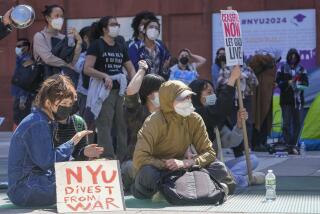Haitian Refugee Camp Nearing Capacity : Exodus: If Coast Guard puts latest wave ashore, Guantanamo Bay shelter will be housing 800 above intended limit. U.S. officials weigh options.
Bush Administration fears about the Haitian crisis appeared to be coming true Wednesday as a new wave of fleeing refugees threatened to deluge the emergency shelter operation at Guantanamo Bay, Cuba, forcing immediate consideration of new measures, all with major disadvantages.
Officials from the State Department, the Pentagon and the Immigration and Naturalization Service met at the White House for a second day to study choices that included upgrading the Cuban camp with permanent buildings, opening another camp in the Caribbean or shipping refugees back home without an immigration hearing or temporary aid.
The latter course, which officials said appears to be emerging as a leading option, would deny Haitians the right to apply for refugee status and almost certainly invite legal challenges. Building permanent structures at Guantanamo Bay not only would be costly and time-consuming, officials said, but also would all but recognize that the camp is becoming a permanent fixture rather than a temporary service.
American officials are pressing members of the Organization of American States--meeting this week in Nassau, Bahamas--to offer a second refugee camp site that would not be under American control. Officials say they are focusing on the island nation of Dominica in the Lesser Antilles, but that proposal met firm resistance from OAS members.
On Wednesday, the U.S. military, which is administering the camp at Guantanamo Bay Naval Station, tallied a total of 11,600 Haitians encamped on shore and another 1,700 still aboard docked Coast Guard cutters that plucked them from the seas off of Haiti earlier this week. Once they are put ashore, the new refugees will bring the total to 800 above the camp’s planned capacity.
The National Security Council is expected to send recommendations to President Bush within days. Its deliberations reflect a recognition that a series of U.S. efforts have done nothing to keep Haitians at home.
Haitians are again fleeing by the thousands, at a rate approaching that during the political turmoil several months ago. On Tuesday, Coast Guard cutters picked up 1,635 Haitians in 15 boats, a staggering one-day total. The more than 10,000 Haitians picked up so far in May is also a one-month record.
At the Pentagon, officials fear that unless the Administration adopts some policy to cut the flow, the American military base at Guantanamo will become a long-term refugee city.
If the Administration issues a directive to the Coast Guard to pick up and return Haitians immediately to their homeland, it will almost certainly ignite legal controversy, because Haitians will have no chance to plead their case for entry into the United States. Since the beginning of the crisis, nearly one-third of the Haitians interviewed have qualified for potential refugee status by demonstrating a well-founded fear of persecution at home.
Reports of widespread unrest in Haiti, and a general strike called for today by supporters of ousted President Jean-Bertrand Aristide, have caused experts to expect the surge of fleeing Haitians to continue.
“There is a great fear of bloodshed in Haiti, and with this renewed pressure . . . I think we’ll continue to see large numbers of people leaving in boats,” said Sharon Brown, an attorney with the Haitian Refugee Center.
While most Haitians remain determined to reach American soil, officials said that reaching the U.S. facilities at Guantanamo Bay has become the objective of the latest arrivals. Officials interviewing the newcomers have observed that throughout Haiti, the Cuban camp has gained a reputation as a “paradise” where the deprivations, political torment and squalid conditions of their home can be left behind, perhaps indefinitely.
“They’re gaining weight at Guantanamo Bay, and they have the luxury of peace of mind there,” said one official familiar with conditions at the camp.
Calm springtime seas in the Caribbean also have proved inviting to the refugees. About 34,000 Haitians have been picked up since October. To date, more than 6,500 Haitians have been flown to the United States to pursue their claim to political asylum, and more than 13,000 have been sent back to Haiti.
Special correspondent Mike Clary contributed to this story from Miami.
More to Read
Start your day right
Sign up for Essential California for news, features and recommendations from the L.A. Times and beyond in your inbox six days a week.
You may occasionally receive promotional content from the Los Angeles Times.







